- Home
- Richard Powers
The Time of Our Singing Page 2
The Time of Our Singing Read online
Page 2
The sounds her boys made pleased Delia so much, it scared them. “Oh, my JoJo! What voices! I want you to sing at my wedding.”
“But you’re already married,” Joey, the younger boy, cried. “To Da!”
“I know, honey. Can’t I still want you to sing at my wedding?”
They loved it too well, music. The boys shrugged off sandlot sports, radio dummies and detectives, tentacled creatures from the tenth dimension, and neighborhood reenactments of the slaughter at Okinawa and Bastogne, preferring to flank their mother at the spinet. Even in those narrow hours before their father returned, when Delia stopped their private lessons to prepare dinner, she had to force-march the boys out of the house to take another dose of torture at the hands of boys more cruelly competent in boyhood, boys who rained down on the two Stroms the full brutality of collective bafflement.
Both sides in the neighborhood’s standing war went after these stragglers, with words, fists, stones—even, once, a softball bat square in the back. When the neighborhood children weren’t using the boys for horseshoe stakes or home plate, they made an example of the freakish Stroms. They sneered at Joey’s softness, covered Jonah’s offending face in caked mud. The Strom boys had little taste for these daily refresher courses in difference. Often, they never made it to the playground at all, but hid themselves in the alley half a block away, calming each other by humming in thirds and fifths until enough time had passed and they could race back home.
Dinners were a chaos of talk and tease, the nightly extension of the years-long Strom-Daley courtship. Delia banned her husband from the stove when she worked. She found the man’s pot-dipping an outrage against God and nature. She kept him at bay until her latest inspired offering—chicken casserole with candied carrots, or a roast with yams, small miracles prepared in those moments between her other full-time jobs—was ready for the stage. David’s task was to accompany the meal with the latest bizarre developments from the imaginary job he held down. Professor of phantom mechanics, Delia teased. Da, more excitable than all his children, laid into the wildest of details: his acquaintance Kurt Gödel’s discovery of loopy timelike lines hiding in Einstein’s field equations. Or Hoyle, Bondi, and Gold’s hunch that new galaxies poured through the gaps between old ones, like weeds splitting the universe’s crumbling concrete. To the listening boys, the world was ripe with German-speaking refugees, safely abroad in their various democracies, busy overthrowing space and time.
Delia shook her head at the nonsense that passed for conversation in her home. Little Ruth mimicked her giggle. But the preteen boys outdid each other with questions. Did the universe care which way time flowed? Did hours fall like water? Was there only one kind of time? Did it ever change speeds? If time made loops, could the future curl into the past? Their father was better than a science-crazed comic book, Astounding Stories, Forbidden Tales. He came from a stranger place, and the pictures he drew were even more fantastic.
After dinner, they came together in tunes. Rossini while washing the dishes, W C. Handy while drying. They crawled through loopy timelike holes in the evening, five lines braiding in space, each one curling back on the other, spinning in place. They’d do workhorse Bach chorales, taking their pitches from Jonah, the boy with the magic ear. Or they’d crowd around the spinet, tackling madrigals, poking the keyboard now and then to check an interval. Once, they divvied up parts and made it through a whole Gilbert and Sullivan in one evening. Evenings would never be so long again.
On such nights, the children seemed almost designed for their parents’ express entertainment. Delia’s soprano lit across the upper register like lightning on a western sky. David’s bass made up with German musicality what it lacked in beauty. Husband anchored wife for any flight she cared to make. But each knew what the marriage needed, and together they used the boys shamelessly to hold down the inner lines. All the while, baby Ruth crawled among them, hitching melodic rides, standing on her toes to peek at the pages her family studied. In this way, a third child came to read music without anyone teaching her.
Delia sang with her whole body. That’s how she’d learned, even in Philadelphia, from generations on generations of Carolina churchgoing mothers. Her chest swelled when she let loose, like the bellows of a glory-filled pump organ. A deaf man might have held his hands to her shoulders and felt each pitch resonating, singed into his fingers as if by a tuning fork. In the years since their marriage in 1940, David Strom had learned this freedom from his American wife. The secular German Jew bobbed to inner rhythms, davening as freely as his great-grandfather cantors once had.
Song held the children enthralled, as tied to these musical evenings as their neighbors were to radios. Singing was their team sport, their Tiddlywinks, their Chutes and Ladders. To see their parents dance—driven by hidden forces like creatures in a folk ballad—was the first awful mystery of childhood. The Strom children joined in, swaying back and forth to Mozart’s “Ave verum corpus” the way they did to “Zip-a-Dee-Doo-Dah.”
Surely the parents heard what was happening to music at that hour. They must have felt the manic pulse—half the world’s GNP, looking for its ruder theme song. Swing had long since played Carnegie, that brash razz already housebroken. Down in the blistering bebop clubs, Gillespie and Parker were nightly warping the space-time continuum. A cracker kid in a designated white house in a black neighborhood off in fly-bitten Mississippi was about to let loose the secret beat of race music, forever blowing away the enriched-flour, box-stepping public. No one alive then could have missed the changes, not even two people as willfully against the grain as that refugee physicist and the Philadelphian doctor’s daughter, his trained-voice wife. They raided the present, too. He had his accented Ella and she her deep-palette Ellington. They never missed a Saturday Metropolitan broadcast. But every Sunday morning, the radio trawled for jazz while David made foot-wide mushroom and tomato omelettes. In the Strom’s singing school, upstart tunes took their place in a thousand-year parade of harmony and invention. Cut-time, finger-snapping euphoria gave those nights of Palestrina all the more drive. For Palestrina, too, once overthrew the unsuspecting world.
Every time the Stroms filled their lungs, they continued that long conversation of pitches in time. In old music, they made sense. Singing, they were no one’s outcasts. Each night that they made that full-voiced sound—the sound that drove David Strom and Delia Daley together in this life—they headed upriver into a sooner saner place.
Delia and David never let a month go by without a round of their favorite public flirtation: Crazed Quotations. The wife settled on the piano bench, a child pressed against each thigh. She’d sit, telegraphing nothing, her wavy black hair a perfect cowl. Her long russet fingers pressed down on several keys at once, freeing a simple melody—say Dvoák’s slow, reedy spiritual “From the New World.” The husband then had two repeats to find a response. The children watched in suspense as Delia’s tune unfolded, to see if Da could beat the clock and add a countersubject before their mother reached the double bar. If he failed, his children got to taunt him in mock German and his wife named the forfeit of her choice.
He rarely failed. By the time Dvoák’s stolen folk song looped back around, the fellow found a way to make Schubert’s Trout swim upstream against it. The ball bounced back to Delia’s court. She had one stanza to come up with another quote to fit the now-changed frame. It took her only a little meandering to get “Swanee River” flowing down around the Trout.
The game allowed liberties. Themes could slow to a near standstill, their modulations delayed until the right moment. Or tunes could blast by so fast, their changes collapsed to passing tones. The lines might split into long chorale preludes, sprinkled with accidentals, or the phrase come home to a different cadence, just so long as the change preserved the sense of the melody. As for the words, they could be the originals, madrigal fa-las, or scraps of advertising doggerel, so long as each singer, at some point in the evening’s game, threaded in their traditional no
nsense question, “But where will they build their nest?”
The game produced the wildest mixed marriages, love matches that even the heaven of half-breeds looked sidelong at. Her Brahms Alto Rhapsody bickered with his growled Dixieland. Cherubini crashed into Cole Porter. Debussy, Tallis, and Mendelssohn shacked up in unholy menages à trois. After a few rounds, the game got out of hand and the clotted chords collapsed under their own weight. Call and response ended in hilarious spinouts, with the one who flew off the carousel accusing the other of unfair harmonic tampering.
During such a game of Crazed Quotations, on a cold December night in 1950, David and Delia Strom got their first look at just what they’d brought into this world. The soprano started with a fat, slow pitch: Haydn’s German Dance no. 1 in D. On top of that, the bass cobbled up a precarious Verdi “La donna è mobile.” The effect was so joyfully deranged that the two, on nothing more than a shared grin, let the monstrosity air for another go-round. But during the reprise, something rose up out of the tangle, a phrase that neither parent owned. The first pitch shone so clear and centered, it took a moment for the adults to hear it wasn’t some phantom sympathetic resonance. They looked at each other in alarm, then down at the oldest child, Jonah, who launched into a pitch-perfect rendition of Josquin’s Absalon, fili mi.
The Stroms had sight-read the piece months before and put it away as too hard for the children. That the boy remembered it was already a wonder. When Jonah engineered the melody to fit the two already in motion, David Strom felt as he had on first hearing that boys’ choir soar above the double chorus opening Bach’s Saint Matthew Passion. Both parents stopped in midphrase, staring at the boy. The child, mortified, stared back.
“What’s wrong? Did I do something bad?” The child was not yet ten. This was when David and Delia Strom first knew that their firstborn would soon be taken from them.
Jonah shared the trick with his little brother. Joseph began adding his own crazed quotes a month later. The family took to ad-libbing hybrid quartets. Little Ruth wailed, wanting to play. “Oh, sweet!” her mother said. “Don’t cry. You’ll get airborne faster than anyone. Fly across the sky before too long.” She gave Ruth simple trinkets—the Texaco radio jingle or “You Are My Sunshine”—while the rest made Joplin rags and bits of Puccini arias lie down together around them in peaceable kingdoms.
They sang together almost every night, over the muffled traffic of distant Amsterdam Avenue. It was all either parent had with which to remind them of the homes each had lost. No one heard them except their landlady, Verna Washington, a stately, childless widow who lived in the brownstone’s other half and who liked to press her ear to their shared wall, eavesdropping on that high-wire joy.
The Stroms sang with a skill built into the body, a fixed trait, the soul’s eye color. Husband and wife each supplied musical genes: his mathematician’s feel for ratio and rhythm, her vocal artist’s pitch like a homing pigeon and shading like a hummingbird’s wings. Neither boy suspected it was at all odd for a nine-year-old to sight-sing as easily as he breathed. They helped the strands of sound unfold as easily as their lost first cousins might climb a tree. All a voice had to do was open and release, take its tones out for a spin down to Riverside Park, the way their father walked them sometimes on sunny weekends: up, down, sharp, flat, long, short, East Side, West Side, all around the town. Jonah and Joseph had only to look at printed chords, their note heads stacked up like tiny totem poles, to hear the intervals.
Visitors did come by the house, but always to make music. The quintet became a chamber choir every other month, padded with Delia’s private singing students or her fellow soloists from the local church circuit. Moonlighting string players from the Physics Departments at Columbia and City College turned the Strom home into a little Vienna. One noisy night, a white-maned old New Jersey violinist in a moth-eaten sweater, who spoke German with David and frightened Ruth with incomprehensible jokes, heard Jonah sing. Afterward, he scolded Delia Strom until she cried. “This child has a gift. You don’t hear how big. You are too close. It’s unforgivable that you do nothing for him.” The old physicist insisted they give the boy the strongest musical education available. Not just a good private teacher but an immersion that would challenge this eerie talent to become everything it was. The great man threatened to take up a collection, if money was the problem.
The problem wasn’t money. David objected: No musical education could beat the one Jonah was already receiving from his mother. Delia refused to surrender the boy to a teacher who might fail to understand his special circumstance. The Strom family chorale had its private reasons for protecting its angelic high voice. Yet they didn’t dare oppose a man who’d rooted out the bizarre secret of time, buried since time’s beginning. Einstein was Einstein, however Gypsy-like his violin playing. His words shamed the Stroms into accepting the inevitable. As the new decade opened onto the long-promised world of tomorrow, Jonah’s parents began searching for a music school that could bring that frightening talent into its own.
Meanwhile, days of instruction that the children swallowed whole went on segueing into evenings of part-songs and improvised games of musical tag. Delia bought a sewing machine-sized phonograph for the boys’ bedroom. The brothers fell asleep each night to state-of-the-art long-playing 33 rpm records of Caruso, Gigli, and Gobbi. Tiny, tinny, chalk-colored voices stole into the boys’ room through that electric portal, coaxing, Further, wider, clearer—like this.
And while he drifted off to sleep one night on this chorus of coaxing ghosts, Jonah told his brother what would happen. He knew what their parents were doing. He predicted exactly what would become of him. He’d be sent away for doing, beautifully, what his family had most wanted him to do. Cast out forever, just for singing.
MY BROTHER’S FACE
My brother’s face was a school of fishes. His grin was not one thing, but a hundred darting ones. I have a photograph—one of the few from my childhood that escaped incineration. In it, the two of us open Christmas presents on the nubby floral-print sofa that sat in our front room. His eyes look everywhere at once: at his own present, a three-segment expanding telescope; at mine, a metronome; at Rootie, who clutches his knee, wanting to see for herself; at our photographing father deep in his act of stopping time; at Mama, just past the picture’s frame; at a future audience, looking, from a century on, at this sheltered Christmas crèche, long after all of us are dead.
My brother’s afraid he’s missing something. Afraid Santa switched the gifts’ name tags. Afraid my present might be sweeter than his. His one hand reaches out to Ruth, who threatens to fall and crack her head on the walnut coffee table. His other hand flies upward to comb down his front curl—the hair our mother forever loved to brush—so the camera won’t capture it sticking up for all eternity like a homemade fishing lure. His smile assures our father that he’s doing his best to make this an excellent picture. His eyes dart off in pity for our mother, forever excluded from this scene.
The photo is one of the first Polaroids. Our father loved ingenious inventions, and our mother loved anything that could fix memory. The black-and-white tones have gone grainy, the look the late forties now have. I can’t trust the shades of my brother’s photographed skin to see just how others might have read him then. My mother was light for her family, and my father, the palest Eurosemitic. Jonah fell right between them. His hair is already more wavy than curly, and just too dark for carrot. His eyes are hazel; that much never changed. His nose is narrow, his cheeks the width of a paperback book. What my brother most resembles is a blood-drained, luminous Arab.
His face is the key of E, the key for beautiful, the face most known to me in the whole world. It looks like one of my father’s scientific sketches, built of an open oval, with trusting half almonds inlaid for eyes: a face that forever says face to me, flashing its seduction of pleasure, mildly surprised, its skin pulled smooth on the rounded bone. I loved that face. It seemed ever to me like mine, released.
&nb
sp; Already he shows the wary distrust, the testing of innocence. The features will narrow as the months move on. The lips draw and the eyebrows batten down. The half-pear nose thins at the bridge; the puffs of cheekbone deflate. But even in middle age, his forehead still sometimes cleared like this and the lips rose up, ready to joke even with his killers. I got an expandable telescope for Christmas. How about you?
One night after prayers he asked our mother, “Where do we come from?” He couldn’t have been ten yet, and was troubled by Ruth, scared by how different she looked from the two of us. Even I already worried him. Maybe the nurses at the maternity hospital had been as careless as Santa. He’d reached the age when the tonal gap between Mama and Da grew too wide for him to call it chance. He gathered the weight of the evidence, and it bent him double. I lay in my bed, flush against his, cramming in a few more panels of Science Comics, starring Cosmic Carson, before lights-out. But I stopped to hear Mama’s answer to the question I’d never thought to ask.
“Where did you come from? You kids?” Whenever a question caught her on the chin, Mama repeated it. It bought her ten seconds. When things turned serious, her voice grew piano, and settled into that caramel, mezzo register. She shifted on the edge of his mattress, where she sat caressing him. “Why, I’m glad you asked me that. You were all three brought to us by the Brother of Wonder.”
My brother’s face twisted, dubious. “Who’s that?”
“Who … ? How did you get so curious? You get that from me or from your father? The Brother of Wonder is named Hap. Mr. Hap E. Ness.”
“What does the E stand for?” Jonah demanded, trying to catch her out.
“What does the E stand for? Why, don’t you know that? Ebenezer.”
Presto: “What’s Wonder’s middle name?”

 The Overstory
The Overstory Bewilderment
Bewilderment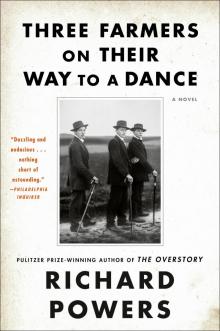 Three Farmers on Their Way to a Dance
Three Farmers on Their Way to a Dance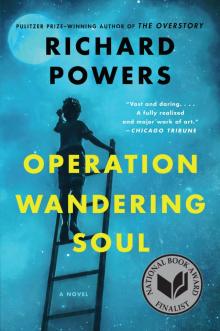 Operation Wandering Soul
Operation Wandering Soul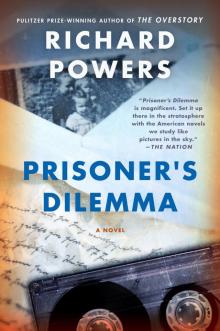 Prisoner's Dilemma
Prisoner's Dilemma The Gold Bug Variations
The Gold Bug Variations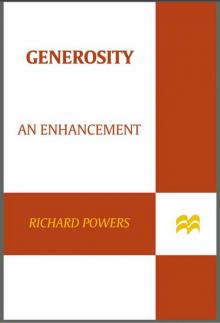 Generosity: An Enhancement
Generosity: An Enhancement The Echo Maker
The Echo Maker Orfeo
Orfeo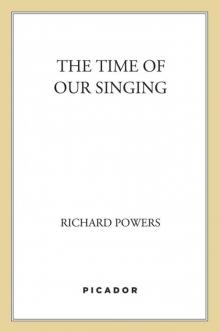 The Time of Our Singing
The Time of Our Singing PLOWING THE DARK
PLOWING THE DARK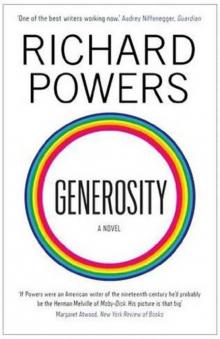 Generosity
Generosity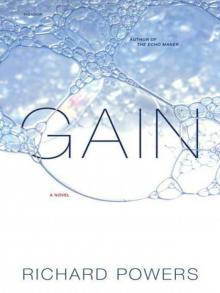 Gain
Gain